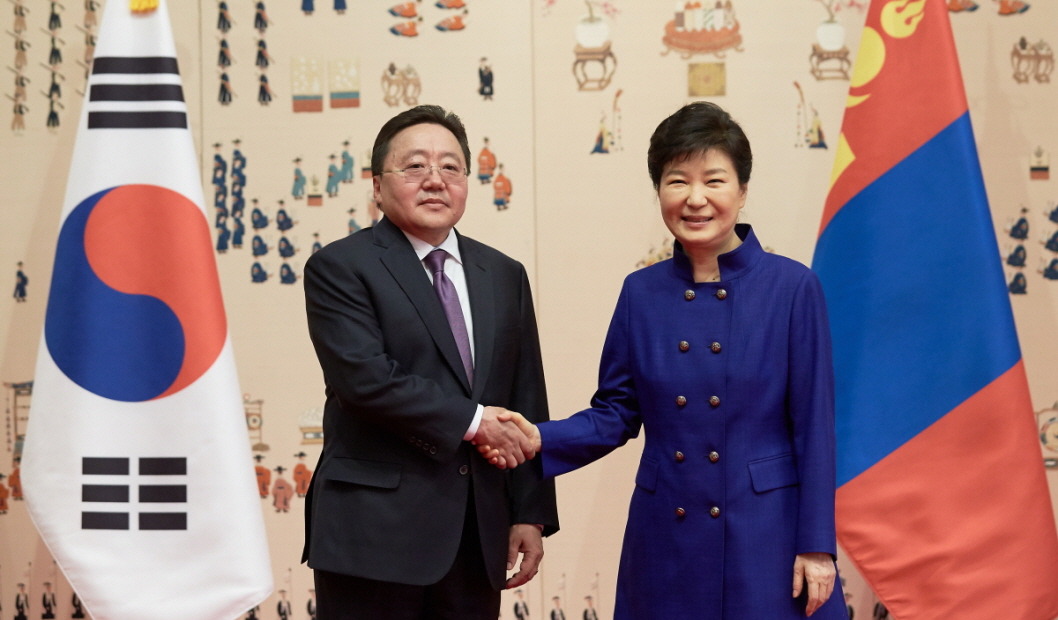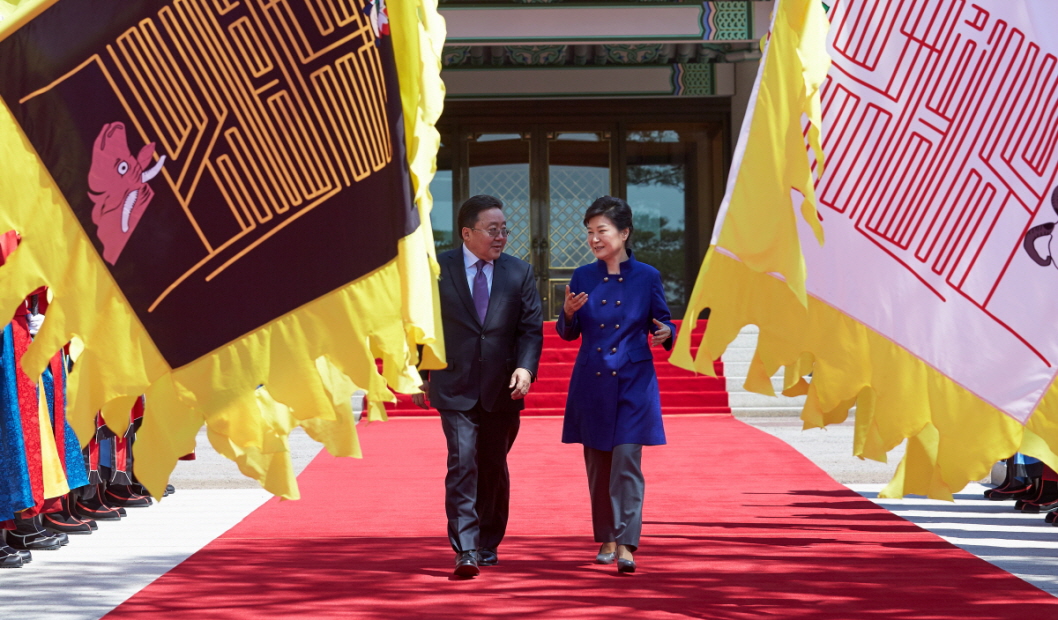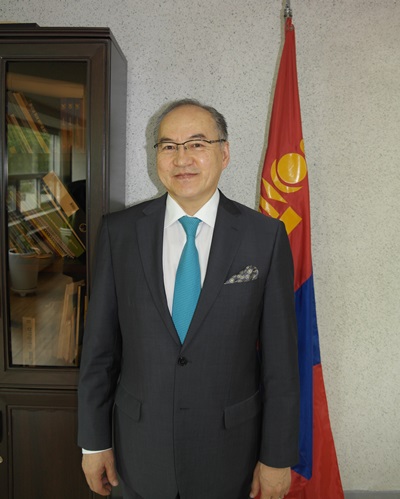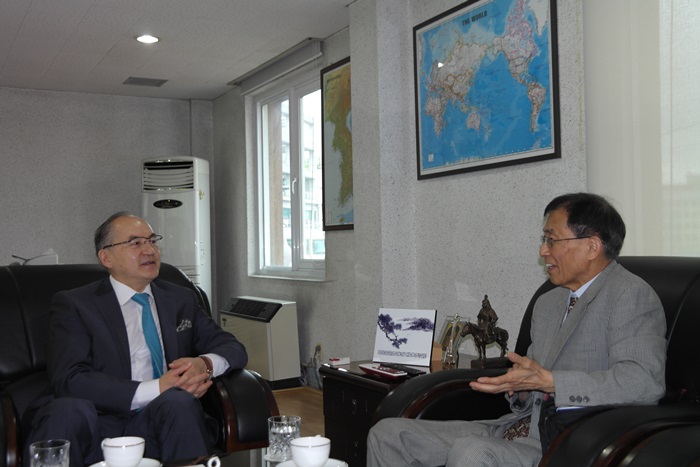Interview with Ambassador Ganbold of Mongolia
President Tsakhia Elbegdorj of the Republic of Mongolia visited Korea on May 19, 2016 and had summit talks with President Park Geun-hye at the Presidential Mansion of Cheong Wa Dae. At this juncture, The Korea Post recently interviewed Ambassador Ganbold Baasanjav to hear about the latest development between Korea and Mongolia. Details of the interview follow.?Ed.

Question: President Park Geun-hye and President Tsakhia Elbegdorj of Mongolia held summit talks on May 19. Would you please advise us as to what transpired from the meeting?
Answer: The visit of the President of Mongolia Tsakhiagiin Elbegdorj to the Republic of Korea was the first visit at the presidential level since 2007 and both sides paid high importance to the visit and exchanged broad views on bilateral, regional and international cooperation.
The current visit was significant in demonstrating the importance of the comprehensive partnership, developed with our third neighbor, the Republic of Korea, and renewed the direction of cooperation based on actual resources and capabilities of the two countries.
Mongolia has rich natural resources, and is considered one of the top ten countries according to natural resource abundance. The Republic of Korea is considered one of the leading countries in terms of newly advanced techniques and technologies, especially in the development of the information technology sector. The state leaders have noted that there are possibilities of broadening and developing the mutually beneficial cooperation by merging the advantages, reserves and capabilities of the two countries.
During the meetings and discussions, the infrastructure, energy, mining, education, information technology, construction and urban development, and green development sectors were defined as main areas of future cooperation and related documents were signed following the agreement to implement major projects in energy, construction and urban development, inter-city transportation sectors and legal reforms through the long-term preferential credits of the Republic of Korea.
It was emphasized that citizen exchange will play an important role in the broadening of relations between our countries, and the sides agreed to closely cooperate in mutually facilitating travel between the two countries, prepare engineering and technical specialists in the Republic of Korea, and the establishment of a joint IT school. As Ambassador, I conclude that the talks were effective and successful.

Q: What are the most promising industrial sectors for the Korean companies to invest in Mongolia?
A: Mongolia is a country with rich natural resources. I want to note that investments, implementation of eco-friendly techniques and technology by Korean companies in major projects in the industrial, infrastructure, road transportation, construction, urban development, ocean transportation, agriculture, food production sector are promising. From year to year, Korean companies, especially major companies, have become more interested in investing in Mongolia. For example, “Samsung” Group executes duties of the contractor in the construction of the new international airport, the construction of the railway from the Tavantolgoi deposit to Gashuun sukhait, and construction of the “Shangri-La” hotel accordingly. Also I gladly note that “POSCO” group was chosen as the contractor in the Combined Heat and Power Plant V project tender and Korea Electric Power Corporation/KEPCO/ was chosen with the privilege of the execution of the Combined Heat and Power Plant II expansion project. Our country has wide reserves of solar, wind and renewable energy. I think that cooperation in the implementation of effective projects in the construction of new power stations in the energy sector, introduction of effective use of electricity and natural gas, and lowering of the Ulaanbaatar city pollution will be promising. For example, in our country non-traditional reserves of energy production, including the use of coal layer methane and use of shale oil are increasing and exploration has been intensified.Korean “Korea Gas Corporation”, in cooperation with Mongolian companies is doing research to implement project of use of coal layer methane from Mongolian biggest coal deposit and works to implement use technology. I think, that in a future we will have board cooperation possibilities in a field of introducing of creative economy, innovations, new techniques and technology.

Q: What are your views conducive to further strengthening the bilateral economic ties and mutual understanding of the two countries:
A: The Republic of Korea is the 4th biggest economy in Asia and a country with state-of-the-art techniques and technologies and numerous “know-how”. It has an experience of establishing free trade agreements with 51 different countries of the world. We have an experience of concluding an Economic partnership agreement with Japan. I think that with a view to augmenting bilateral trade turnover and creating of new bases for economic cooperation, we need to launch studies on establishing Free trade agreement at the level of corresponding organization. I am pleased to note that as the Ambassador I am paying a particular attention on this matter and exchanging views with relevant Korean organizations.
Information exchange between individuals and businesspeople of both countries is of importance for investment and trade development. In 2013, KOTRA or Korea Trade-Investment Promotion Agency opened its office in Ulaanbaatar, which studies business and investment environment of Mongolia at the professional level and provides information to Korean businessman and helps them to establish business contacts. I think that Mongolian businesspeople likewise should mobilize this organization for studying best Korean practices, attending various meetings, workshops and trade fairs in this country, and finding out good partners which will bring tangible outcomes.
Q: What is the significance of your National Day, Naadam, on July 11?
A: First and foremost, I would like to take this opportunity to extend my warmest greetings to esteemed readers of the Korea Post magazine.
Mongolians celebrate its National holiday marking Mongolia’s independence and sovereignty on July 11 to 12 each year. The main core of the celebration is Naadam festival which content and forms represent national culture and traditions rooted deep in the ancient state ceremonial festivals dating back to XIII century. Naadam or three manly games consist of wrestling, horse racing and archery and are a complex ceremony of traditional rituals of Mongolians as it combines the three main attributes with folklore and folk arts and even traditional handcraft.
The Naadam wrestling tournaments are usually held among 512 wrestlers, in some jubilee years, their number doubles on a wide space, thereby, their weight and age are not counted at all. When the elbow, knee, head or any part of body touches the ground, the wrestler is defeated. Mongolians are the nation, who has treat horses with great respect from ancient time. This is manifested in the next indispensable part of “Naadam” festival which is horse racing where 100-500 fastest horses from all corner of the country run in 5 age categories each. Nowhere else in the world, but in Mongolia, you will see such a horse race where the fastest horses are challenged in the distance of 20-30 kilometers testing their speed and power. And the third event is archery where two opponents compete with each other by taking turns shooting arrows from the distance of 75-80 meters. Winners in archery competitions are awarded with marksman rank and titles.
In 2010, Mongolian national festival ? “Naadam” was registered by UNESCO in World cultural heritage list, which indicates a great contribution Mongolians have made to the world cultural heritage with our traditions, custom, unique lifestyle of nomadic civilization.

Q: Please introduce the 25-year history of diplomatic and economic relations between Korea and Mongolia.
A: Mongolia and Korea established diplomatic relations 26 years ago. 26 years is a short period, but it was full of success and accomplishments. Along with strengthening of political relations between two countries, bilateral ties have progressed in all socio-economic sectors. Certainly, every relationship faces difficulties and challenges. However, the Mongolia-Korea relations have a long history, our nations go back a long way, having a lot in common in terms of culture and traditions. Therefore we could build a mutual understanding and friendly relationship which laid solid foundation for present bilateral ties.
The Republic of Korea is the closest to Mongolia in Northeast Asian region third neighbor for our foreign policy, bound by shared democratic values of respecting human rights and freedom, and market relations. I would like to highlight that currently the Republic of Korea becomes our 4th major trade and investment partner, and people-to-people contacts expanded their content and scopes to develop into one of the pillars of our relations.
Boosting bilateral trade and investment and developing mutually beneficial economic cooperation are essential for further widening and developing comprehensive partnership relations between the two countries. If in the first years after establishment of diplomatic relations, bilateral trade turnover was only 270,000 USD, last year this figure reached 325 million USD, which shows 130fold increase during 26 years. I am delighted that besides growing trade turnover, leading companies of the Republic of Korea are participating in big construction projects in Mongolia. I believe that there is a huge potential for bilateral cooperation taking into consideration such factors as resources and geographical location.

